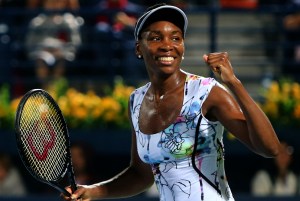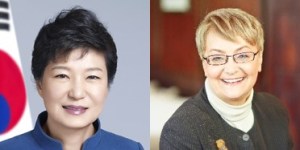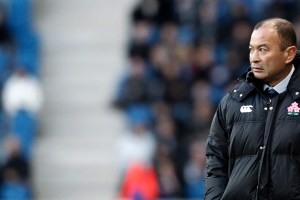Preview : CNN International Programme Information Weeks 12 and 13
Vital Signs with Dr. Sanjay Gupta
Wednesday 19 March at 0930 GMT / 1030 CET and 1630 GMT / 1730 CET Saturday 22 March at 0430 GMT / 0530 CET and 1830 GMT / 1930 CET Sunday 23 March at 1230 GMT / 1330 CET Saturday 29 March at 0430 GMT / 0530 CET and 1230 GMT / 1330 CET Sunday 30 March at 0530 BST / 0630 CET, 1330 BST / 1430 CET and 1930 BST / 2030 CET
‘Vital Signs with Dr. Sanjay Gupta’ is CNN’s monthly programme which offers viewers a global look at the world of medicine, hosted by CNN’s Chief Medical Correspondent, Dr. Sanjay Gupta.
Imagine a world with no organ transplant waiting list, or no chance of the body rejecting an organ or implant. The solution could come from a simple printer – a 3D printer – that prints layers of human cells instead of ink, and could change the face of medicine forever. In the first episode of CNN’s ‘Vital Signs with Dr. Sanjay Gupta’, explore the world of 3D printing in the medical field. From human organs to prosthetics, see how this revolutionary technology could change medicine as we know it – before you know it.
@drsanjayguptaOpen Court
Thursday 20 March at 0930 GMT / 1030 CET and 1730 GMT / 1830 CET Saturday 22 March at 0730 GMT / 0830 CET and 2100 GMT / 2200 CET Sunday 23 March at 1630 GMT / 1730 CET Duration: 30 minutesThis month ‘Open Court’ toasts America’s tennis icons past and present. In Miami, Florida, the show meets Venus Williams trying to extend the winning streak she began in Dubai when she beat Alize Cornet and Caroline Wozniacki. The grand slam champion talks to CNN before she begins her Sony Open campaign, and also catches up with her younger sister Serena as she defends her title at the same competition.
The Williams sisters have dominated women’s tennis for the past decade, but before they came on the scene, American tennis fans would cheer for Andre Agassi and Pete Sampras. The programme spends a day with the legends of the game as they return to London in honor of World Tennis Day. They talk about their rivalry – before demonstrating that the competitive edge still burns bright in a short game.
CNN.com/opencourt Facebook.com/cnnopencourt @cnnopencourt @TheRealPatCash @VenuseswilliamsLeading Women
Wednesday 26 March at 0930 GMT / 1030 CET and 1730 GMT / 1830 CET Saturday 29 March at 0430 GMT / 0530 CET and 1830 GMT / 1930 CET Sunday 30 March at 1330 BST / 1430 CET Duration: 15 minutesEach month, ‘Leading Women’ profiles two extraordinary women of our time. This edition of the programme features Park Geun-Hye and Henryka Bochniarz – two remarkable women who have made it to the top of their field.
Elected in 2012, Park Geun-Hye made history as the first female President of the Republic of Korea. An experienced lawmaker, Park spent year prior to her presidency as a member of the Korean National Assembly and as Chairperson of the Grand National Party (now known as the Saenuri Party). Daughter of President Park Chung-hee, Park was also acting First Lady of South Korea between 1974, when her mother was killed by a North Korean agent, and 1979 when her father President Park Chung Hee, was assassinated by his own intelligence chief.
One of the most important voices in the public debate on economic and social growth in Poland, and the EU, Dr. Henryka Bochniarz is a commentator and representative of the Polish business community. Currently the head of Lewiatan, the largest organization of private sector employers in Poland, Bochniarz is also a member of the Council of President of BUSINESSEUROPE, the biggest and most important employers’ organization in the European Union. A strong supporter of women in business and political life, Bochniarz was placed on ‘Wprost’ magazine’s list of the 50 Most Influential Poles in 2012.
Cnn.com/leadingwomen @CNNIWomenRugby Sevens Worldwide
Thursday 27 March at 0945 GMT / 1045 CET, 1745 GMT / 1845 CET Saturday 29 March at 0745 GMT / 0845 CET, 2115 GMT / 2215 CET Sunday 30 March at 1745 BST / 1845 CET Duration: 15 MinutesRugby Sevens Worldwide, sponsored by HSBC, is CNN’s series bringing viewers the latest from one of the world’s fastest-growing games, and newest Olympic sports, Rugby Sevens.
This month’s programme visits Japan, which will host the Rugby World Cup in 2019. The sport is something of a national obsession in the country, with even Emperor Akihito lending the game his support when he recently attended a match for the first time. Host Christina Macfarlane speaks to Japan coach Eddie Jones about the growing popularity of Sevens in the country, and she watches the men’s team prepare for the home leg of the HSBC Sevens World Series.
The show also followed the Fijian sevens squad as they prepared for February’s competition in Las Vegas. From training sessions to school visits, this is rare behind-the-scenes access to the team at work, at play and at prayer.
Rugby Sevens Worldwide also meets Akira Ioane – the 18-year old All Black player being compared to a young Jonah Lomu – and rounds up all the highlights from the action at the Tokyo sevens tournament.
edition.cnn.com/SPORT/rugby-sevens @chrissmaccnn #rugbysevensAfrican Start-up
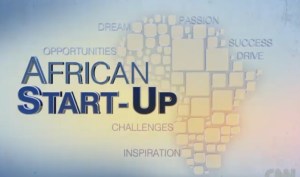 Friday 28 March at 0930 GMT / 1030 CET and 1530 GMT / 1630 CET
Saturday 29 March at 0830 GMT / 0930 CET, 1300 GMT / 1400 CET and 2030 GMT / 2130 CET
Sunday 30 March at 1030 BST / 1130 CET and
Monday 31 March at 0430 BST / 0530 CET and 0830 BST / 0930 CET
Tuesday 1 April at 1030 BST / 1130 CET and 1730 BST / 1830 CET
Wednesday 2 April at 0530 BST / 0630 CET
Duration: 30 Minutes
Friday 28 March at 0930 GMT / 1030 CET and 1530 GMT / 1630 CET
Saturday 29 March at 0830 GMT / 0930 CET, 1300 GMT / 1400 CET and 2030 GMT / 2130 CET
Sunday 30 March at 1030 BST / 1130 CET and
Monday 31 March at 0430 BST / 0530 CET and 0830 BST / 0930 CET
Tuesday 1 April at 1030 BST / 1130 CET and 1730 BST / 1830 CET
Wednesday 2 April at 0530 BST / 0630 CET
Duration: 30 Minutes
‘African Start-Up’ profiles new SMEs (small and medium size enterprises) from across Africa, discovering how entrepreneurs on the continent are working to formulate business plans, raise capital and build prosperity in their communities.
Entrepreneurs profiled in this half-hour show include: Selebogo Molefe, the Johannesburg native behind ‘The HookUp’, a networking event for start-up proprietors; South African Sibusiso Ngwenya who has set up a high-end sock brand Skinny Sbu Socks; Ghanaian shoe designer Fred Deegbe who believes that his start-up, Heel the World, can compete with high-end fashion designers; Regina Agyare, the Ghanaian behind software development company Soronko Solutions; Gossy Ukanwoke, who set up Nigeria’s first online university; Lagos-based Bilikiss Adebiyi, the businessman behind Wecyclers which aims to reduce the 10,000 tons of landfill waste which the Nigerian capital produces daily, and Senegalese entrepreneur Stephan Senghor, whose recycling and sustainable development company based in the outskirts of Dakar turns waste plastic and glass into building materials.
http://edition.cnn.com/SPECIALS/AFRICA/african-start-up #africanstartupCold War: After Stalin, 1953-1956
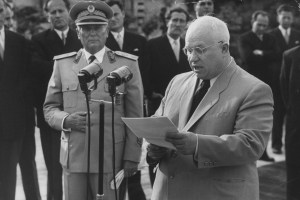
Soviet Premier Nikita Kruschev issues apology for Stalin’s brutal repression of Yugoslavia, 1955 (Credit: Getty)
CNN’s critically acclaimed ‘Cold War’, narrated by Kenneth Branagh, continues in the year which marks the 25th anniversary of the fall of the Berlin Wall.
This episode examines the period 1953-1956, following Stalin’s death, as Nikita Khrushchev became leader of the Soviet Union. Dealing with the aftermath of Stalin’s personality cult, Krushchev rolled back a number of oppressive measures in a condemnation of his ruthless rule.
Although Krushchev mended relations with Yugoslavia, Soviet control of Eastern Europe was soon threatened. West Germany joined NATO in 1955, and rising tensions in East Germany, Poland, and most significantly Hungary, led to a string of uprisings and revolts again Soviet rule.
Khrushchev initiated the Warsaw Pact in 1955 to calm relations and secure military control but faced with growing unrest, ordered Soviet troops to quell the revolts, resulting in thousands of casualties.
www.CNN.com/ColdWar #ColdWar

